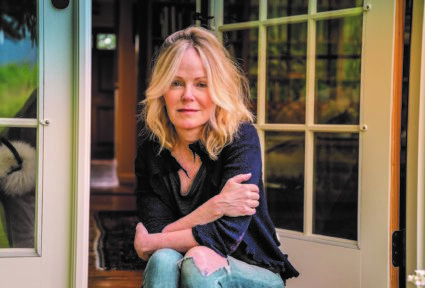
How a surprising DNA test inspired this writer's memoir
Our March pick for the PBS NewsHour-New York Times book club "Now Read This" is Dani Shapiro's "Inheritance." Become a member of the book club by joining our Facebook group, or by signing up to our newsletter. Learn more about the book club here.
For Dani Shapiro, finding out that the father who had raised her was not, in fact, her biological dad "was such an impossible thing to learn, in midlife." The unexpected results of a DNA test sent her on a frantic "fact-finding mission" about her family history, and within 36 hours she had identified the man who was her biological father.
While grappling with this news was difficult, Shapiro, a memoirist by trade, knew immediately what to do as she processed this information: She started taking notes about her experience.
"As a writer, I arrange words and scenes on the page as a way of coming to understand myself and the world around me," Shapiro told the PBS NewsHour. "I began that process – jotting down notes – almost immediately, because that's what I do. It wasn't more than a week or two before I realized that I had a story on my hands – an important story – and though I had previously never known it, nor wanted it, it was mine, and I wanted to do it justice."
Shapiro writes the first drafts of her works longhand, as she finds working on a computer "a bit like trying to write in the middle of an amusement park." She also values time away from her writing, when she can "stop, dream, talk" or even take baths. It allows her to "shift gears and allow the creative mind to do its own work."
Read more about her daily routine, and how she wrote "Inheritance," below.
What is your daily writing routine?
When I'm writing a book, I keep regular hours. It helps me to write when it seems everyone around me is doing their job as well. I've never been one of those middle-of-the-night writers. I try to get a foothold in the work early in the morning, before the troubles of the world intrude. But the very first thing I do in the morning (after caffeinating) is to meditate for 20 minutes. I find that meditation practice and writing practice have remarkable similarities
In meditation, there is resistance. In writing, there is resistance. In meditation, there's the desire (at least I have it!) to check my watch, or suddenly I think: I'm hungry, or I really ought to write that idea down. Those thoughts tend to occur when my mind is about to be pierced by something important.
It's the same with writing. Except for the writer, it's terribly easy to switch gears when it gets uncomfortable, simply by checking email or going online.
To avoid that temptation, I tend to start first drafts longhand. Composing work on a computer is a bit like trying to write in the middle of an amusement park.
What is your favorite childhood book? Or one book you think everyone should read?
My favorite childhood book, as is true for many women of my generation, was "Are You There God? It's Me, Margaret," by Judy Blume. It was the first time I had that feeling of recognition while reading. I saw my thoughts and feelings, my inner life, mirrored in another. That's one of the great consolations of literature. As for one book I think everyone should read, "The Overstory" by Richard Powers is the "Moby Dick" of our time. A clarion cry, a wake-up call, a masterpiece that changed and deepened the way I look at the natural world. I read it on vacation earlier this year and felt my pulse slow, even as my heart raced.
What is something you've seen, watched or read that you think is overlooked and deserves more attention?
"Sleepless Nights" by Elizabeth Hardwick was ahead of its time as a genre-defying book. It was first published in 1979 and eventually fell out of print. Though it's back in print today, I still encounter so many people who have never heard of it, including graduate students in creative nonfiction — and this is a crime! Hardwick creates a mosaic of memories, letters, fragments, dreams, and assembles a cast of characters, many from the author's life, without ever defining the work as fiction or nonfiction. In this era of auto-fiction (since we seem hell bent on defining terms) Hardwick's slim, brilliant book stands as a precursor and standard-bearer.
What is the best piece of writer's advice you've received?
It was Grace Paley, my teacher in college, who once told us she wrote in the bathtub. At the time, I didn't understand what she meant. Why was she telling us this?
I imagined Grace, neck deep in bubbles, holding a pad and pen aloft. It seemed cumbersome and soggy. But like all great teachers, as the years passed, her words lingered. One day, stuck on a particular passage, I ran a bath. I stopped, slipped into the warm water, closed my eyes. When I emerged, the problem had solved itself. And I realized that Grace was telling us to stop, dream, walk, take baths — in other words, to shift gears and allow the creative mind to do its own work.
Can you describe the moment you knew you wanted to write this particular book? And when did you know it was over?
In the first days after my DNA results were returned to me and I realized my beloved dad who raised me hadn't been my biological father, and then in the 36 ensuing hours when I was able to zero in on the man who was my biological father, my mind was at once razor sharp and completely addled. I was on a fact-finding mission and I was extremely focused, but there was a huge part of me that felt mute, tremulous, child-like. It was such an impossible thing to learn, in midlife. As a writer, I arrange words and scenes on the page as a way of coming to understand myself and the world around me. I began that process – jotting down notes – almost immediately, because that's what I do. It wasn't more than a week or two before I realized that I had a story on my hands – an important story – and though I had previously never known it, nor wanted it, it was mine, and I wanted to do it justice. I wrote "Inheritance" as the story was unfolding – not quite in real time, but not far from it either – and it came to a place of a natural ending. Sometimes you just feel these things, as if the book is music.
Support Canvas
Sustain our coverage of culture, arts and literature.












